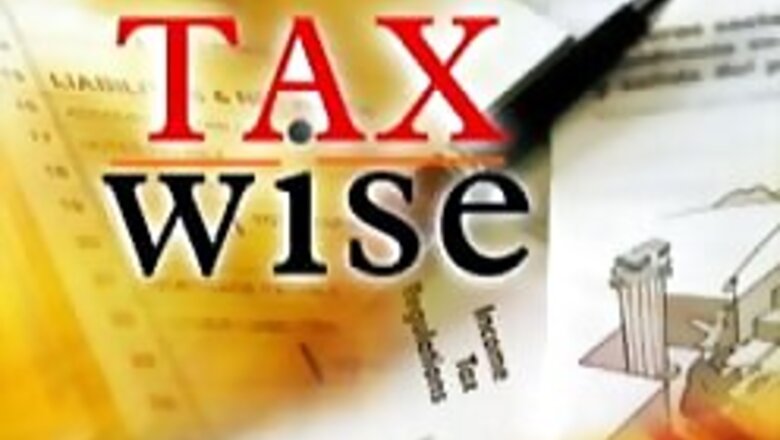
views
Mumbai: Yes, it is possible for individual tax payers as also for the Hindu Undivided Families to make investment in bank fixed deposit and save income-tax too in respect of the income for the financial year 2006-2007.
It may be recalled here that for the first time the Finance Act, 2006 provides for a clear cut provision in terms of section 80C (2)(xxi) whereby your investment in a term deposit for the fixed period of not less than five years with a scheduled bank would entitle you to a deduction upto Rs 1 lakh from your total income.
This deduction of Rs 1 lakh is a combined deduction as per section 80C in respect of investments made by the tax payer either in insurance, PF (Provident Fund), PPF (Public Provident Fund), NSC (National Savings Certificate), ELSS (Equity Linked Savings Scheme), repayment of the housing loan or payment of the children’s education fee.
Thus, for the first time your investment in bank fixed deposit will entitle you the same tax benefit as is available for payment of premium on life insurance policy etc.
Before getting into some more details and the intricacies of enjoying the tax deduction in respect of bank fixed deposit, it would be worthwhile to refer to the specific provisions of section 80C (2).
This section contains a list of all those items in which if the investment is made by a tax payer, he is entitled to enjoy the deduction up to Rs 1 lakh per annum.
Now apart from the existing list a new items has been added in section 80C, which specifically provides deduction u/s 80C (2) in respect of investment made by the taxpayer for taking out a bank fixed deposit.
PAGE_BREAK
The salient features for availing this special deduction is that the fixed deposit should not be for a period less than five years.
Thus, it implies that if a bank fixed deposit is made for duration of less than five years then the investment in the said bank fixed deposit will not entitle the tax payer to the tax benefits.
Another important feature, which should be taken care while making the investment in bank fixed deposit, is that such fixed deposit should be made only with the scheduled bank. Thus investments made by you in the form of bank fixed deposit with a non-scheduled bank will not entitle you to any tax benefit.
In view of this special condition all those persons who would desire to enjoy the benefit of tax deduction in respect of investments made by them in bank fixed deposit should ensure that the fixed deposit made by them is for a minimum tenure of five years and that such fixed deposit is only with a scheduled bank.
Finally, the provisions contained in the Income Tax Act provide that the term deposit as such should be in accordance with the scheme framed and notified by the Central Government.
The Tax payer would be happy to note that now the said scheme has been notified and the scheme is known as 'Bank Term Deposit Scheme, 2006' which has been notified vide Notification No. 1220 (E) dated 28th July, 2006.
The bank term deposit scheme contains all necessary procedural formalities in connection with taking out a term deposit for availing the tax benefit u/s 80C of the Income-tax Act, 1961. It may be recalled that the investment in the bank term deposit can be made by the assessee from any of the sources of the money available with him.
Thus, to avail the tax benefit, it is not necessary that the investment should be made only out of the income of the year.
Hence, if a tax payer were to receive some maturity proceeds of an existing fixed deposit or were to receive some other payment which may not be the income of the year and even if he were to make the investment from all those sources, then also he would enjoy the benefit of tax deduction u/s 80C.
The salient features of the newly introduced Bank Term Deposits Scheme, 2006 are analysed in the subsequent paragraphs fro the benefit of the investors.
PAGE_BREAK
The Bank Term Deposit Scheme, 2006 clearly mentions that for the purposes of this scheme assessee means an Individual or a Hindu Undivided Family. Thus, any other category of tax payer is not entitled to tax benefit u/s 80C of the Income Tax Act, 1961.
Further, the said scheme clearly states that an assessee can invest in the term deposit of a scheduled bank any amount not exceeding Rs 1 lakh in a year. Thus, there is a upper ceiling of investment of Rs 1 lakh as term deposit with the scheduled bank.
Now, coming to the minimum amount that can be invested in the term deposit it is provided in the scheme that a minimum of Rs100 or multiples thereof can be invested in the term deposit of a scheduled bank.
The term deposit so made with the scheduled bank shall be of two types namely single holder type deposits and joint holder type of deposits.
While discussing the types of term deposit the scheme clearly states that the single holder type deposit shall be issued to an individual for himself or in the capacity of the karta of the Hindu undivided family.
The Joint holder type deposit receipt may be issued jointly to two adults or jointly to an adult and a minor, and payable to either of the holders or the survivor.
A question may also arise in the joint holder type of deposit as to which assessee will enjoy tax benefit. To clarify this issue the Bank Term Deposit Scheme clearly provides that in the case of joint holder type deposit, the deduction from income under section 80C of the Act shall be available only to the first holder of the deposit.
Adequate safeguards have been provided in the Bank Term Deposit Scheme with regard to nomination in respect of the fixed deposit.
It is provided in the scheme that the single holder or the joint holders of a term deposit may, by filing in necessary particulars in the prescribed form at the time of making the term deposit, nominate any person who, in the even of death of the single holder or both the joint holders, as the case may be, shall become entitled to the deposit and to the payment due thereon.
PAGE_BREAK
If such nomination is not made at the time of making the term deposit, it may be made by the single holder, the joint holders or the surviving joint holder, as the case may be, at any time after the term deposit receipt is issued, but before its maturity, by means of an application in the prescribed form to the officer in charge of the branch of the bank from which the term deposit receipt was issued.
While dealing with the procedural aspects of investment in the Term Deposit Scheme for availing the tax benefit it is clearly provided that the assessee desiring to invest in the term deposit shall make an application in the prescribed form with any of the branches of the scheduled bank.
After making the application the bank will issue the term deposit receipt to the assessee. It is also possible to transfer the term deposit from one branch of the scheduled bank to another branch of the same scheduled bank.
However, no term deposit can be transferred from one scheduled bank to another scheduled bank. All those tax payers intending to make investment in the bank term deposit to avail the tax benefit should clearly note that the term deposit shall not be pledged to secure loan or as security to any other asset.
It is further provided that if the term deposit receipt is lost, stolen, destroyed, mutilated or defaced, the person entitled thereto may apply for the issue of a duplicate receipt to the branch of the scheduled bank from where the receipt was issued.
Now coming to the aspects connected with the maturity of the term deposit, the scheme clearly states that the maturity period of a deposit receipt shall be five years commencing from the date of receipt and that no term deposit shall be encashed before the expiry of five years from the date of its receipt.
Coming to the rate of interest on such term deposits, the scheme clearly states that the rate of interest on term deposit shall be in accordance with the rate of interest fixed by the scheduled bank from time to time.
The interest of the term deposit may be paid either in lump sum at the time of maturity or it may be paid every quarter or every month in accordance with the regulatory guidelines for payment of interest on the term deposit.
In case the interest on the term deposit is payable in lump sum at the time of maturity then the term deposit shall bear the yearly rate of interest on the term deposit.
Tax payers would be happy to note that as per the present provisions contained in the Income Tax Act, 1961, no income tax would be payable on the maturity amount of the bank term deposit. Thus, it is only interest so received by the assessee or the accumulated interest to be received by the assessee, which alone would be subjected to income tax.
PAGE_BREAK
Another very important point which should be remembered by the tax payers taking advantage of the term deposit scheme with the scheduled bank is that the interest on these term deposits shall be liable to tax under the Act, on the basis of annual accrual or receipt, depending upon the method of accounting followed by the assessee.
As the interest income from the term deposit with a bank would be liable to income tax, hence, the tax payer should clearly remember that they should declare their interest income in the return to be filed by them.
Non-declaration of the income would invite tax complications by way of penal interest, penalty etc.
Hence, please do not forget to include your interest income from the bank term deposits in the Income-tax return filed by you.
The tax deduction as mentioned above in respect of the investments made in bank term deposit would be enjoyed by the individual making the investment.
However, please note that the benefit of tax deduction cannot be availed of by taking out a bank term deposit in the names of some of your family members or relatives.
The best theme to avail the deduction on bank term deposit scheme would be to take out a single holder type of term deposit and make a nomination in the prescribed form.
Taking into account the tax benefit which is available on the bank term deposit scheme with the scheduled bank, it surely makes a sense for a large number of tax paying public to make investment in the bank term scheme to enjoy a secure, safe investment on the one hand while on the other hand to avail a tax deduction in terms of section 80C of the Income-tax Act, 1961.
Senior citizens would really enjoy their investment in bank term deposit scheme because they are not able to enjoy various other modes of investment on which the benefit of section 80C is available specially looking to their age profile.
Hence, liberal use of the bank term deposit scheme with the scheduled bank is recommended particularly for senior citizens, women tax payers and persons coming within the taxable income category upto Rs 1,50,000.
The biggest advantage of the bank term deposit scheme is that it is 100 per cent safe and secure while on the other hand the investment in the bank term deposit scheme presents no hassles and thus it is easy and simple to make the investment in the bank term deposit scheme with the scheduled bank and also to enjoy the tax deduction.
The author, Subhash Lakhotia, is Tax and Investment Consultant in New Delhi for the last over 35 years.




















Comments
0 comment